I read quite a lot of books. So I’d like to talk about the one which I consider most influential upon my worldview. This wasn’t Smith nor Marx, not the Bible nor Quran. It wasn’t particularly well written, nor did it contain groundbreaking ideas. I don’t even remember the title or author. The book which has remained lodged in my mind is the biography of Saddam Hussein which I read in high school.
Category: Book Nook
-
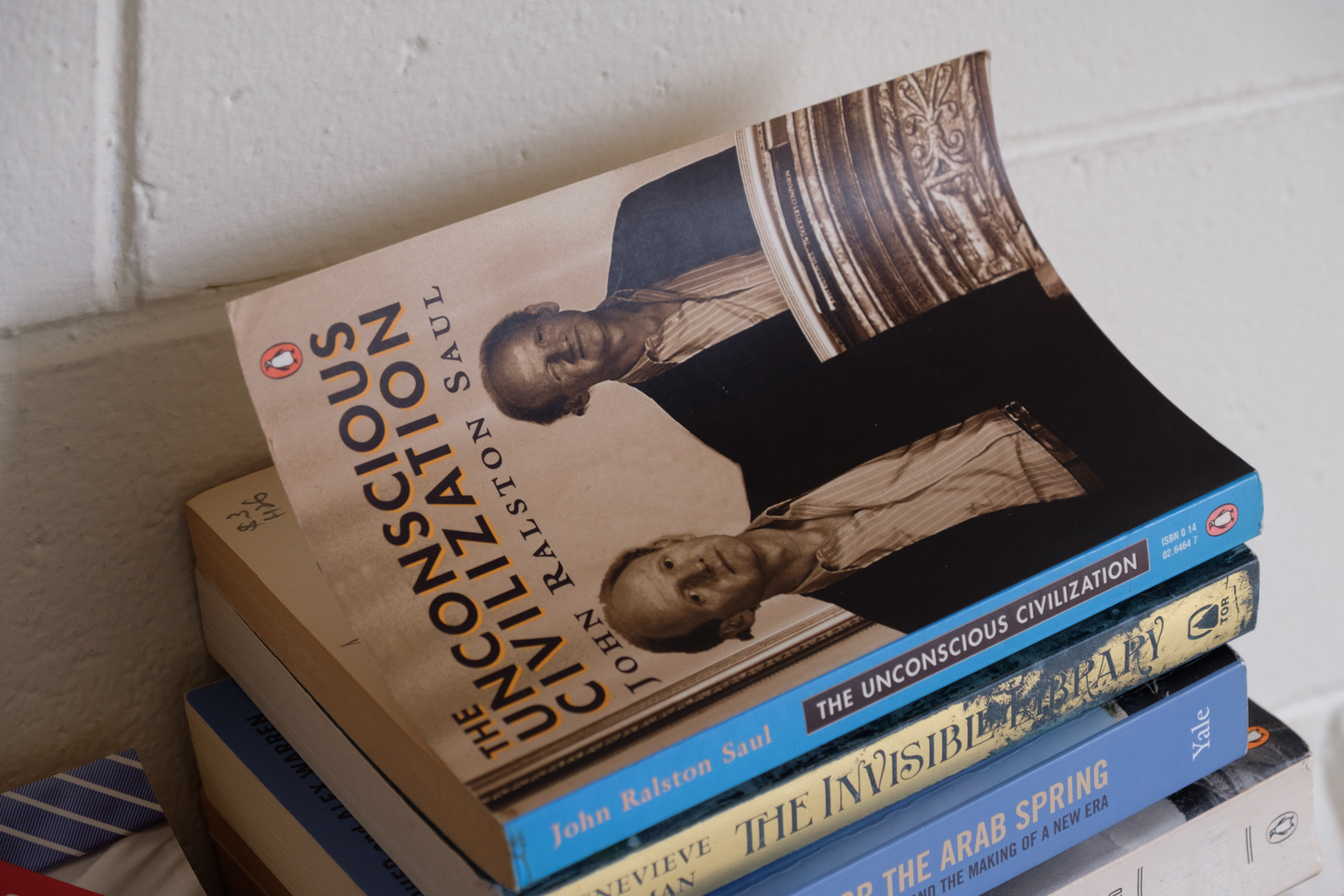
To What Extent is Society Driven by Ideas?
Ideas are one driver of our society, along with material conditions, power dynamics, great men and a swathe of smaller influences. But are they the central pillars, or just of tangential importance? John Ralston Saul’s The Unconscious Civilization posits that a corporatist ideology is responsible for the ills of society, and that throwing off those intellectual shackles will resolve them.
-
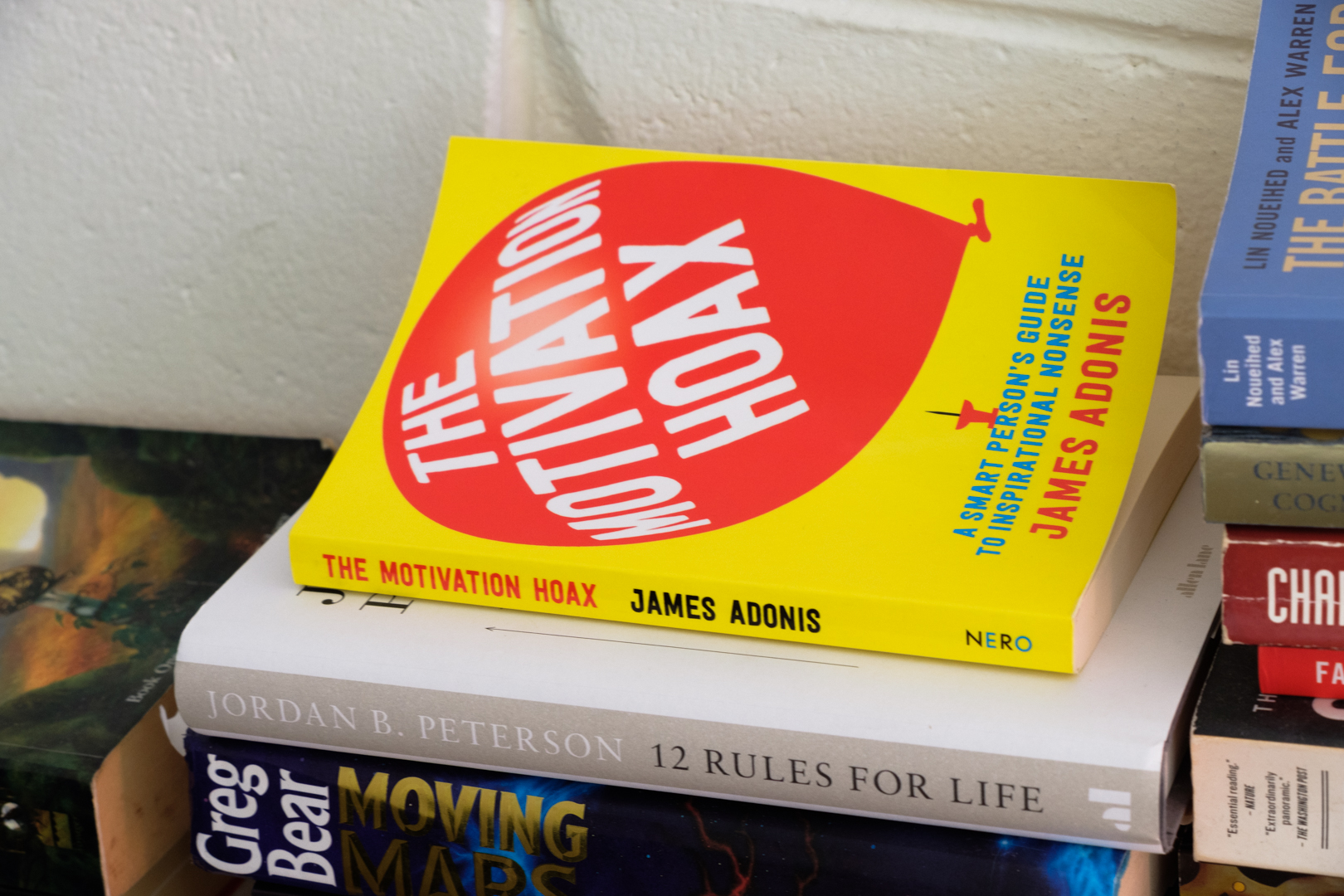
The Motivation Hoax
There are many motivational aphorisms which have passed from supposition to accepted fact without containing even a grain of truth. The Motivation Hoax by James Adonis sets out to disprove axioms like ‘the more you sweat, the luckier you get’ and ‘success is a journey, not a destination’. While this book achieves its measurable goals, it falls short of providing a genuine understanding.
-
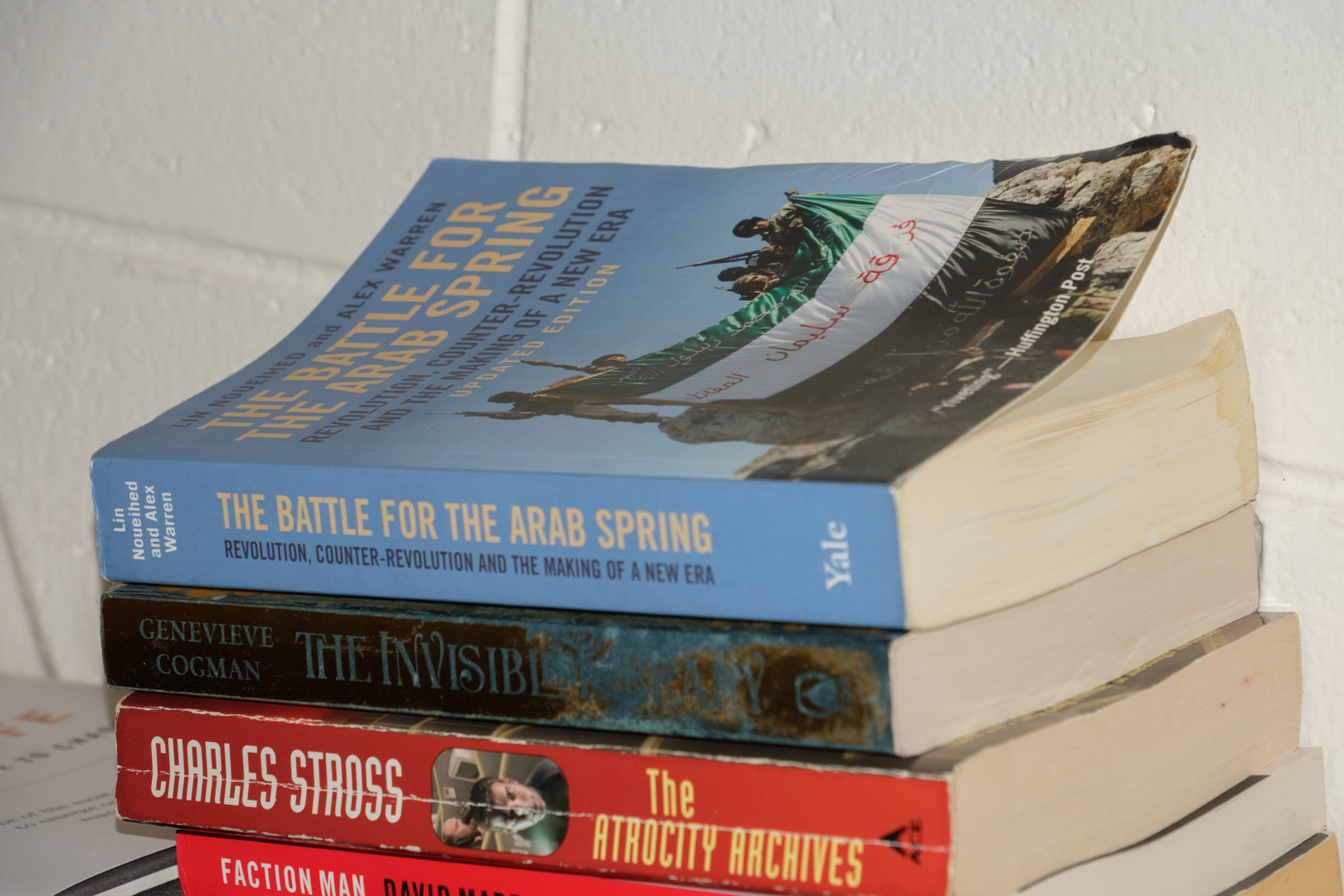
Lessons from the Arab Spring
The self-immolation of Tunisian vegetable seller Mohammed Bouazizi in late 2010 set off a wave of protest and revolution against stagnant dictatorships across the Arab world. Ordinary citizens stood up against their tyrants and forced them out with people power. Lin Noueihed and Alex Warren’s The Battle for the Arab Spring tells the story of these rebellions – a tale which should be heeded by those who seek a better world.
-
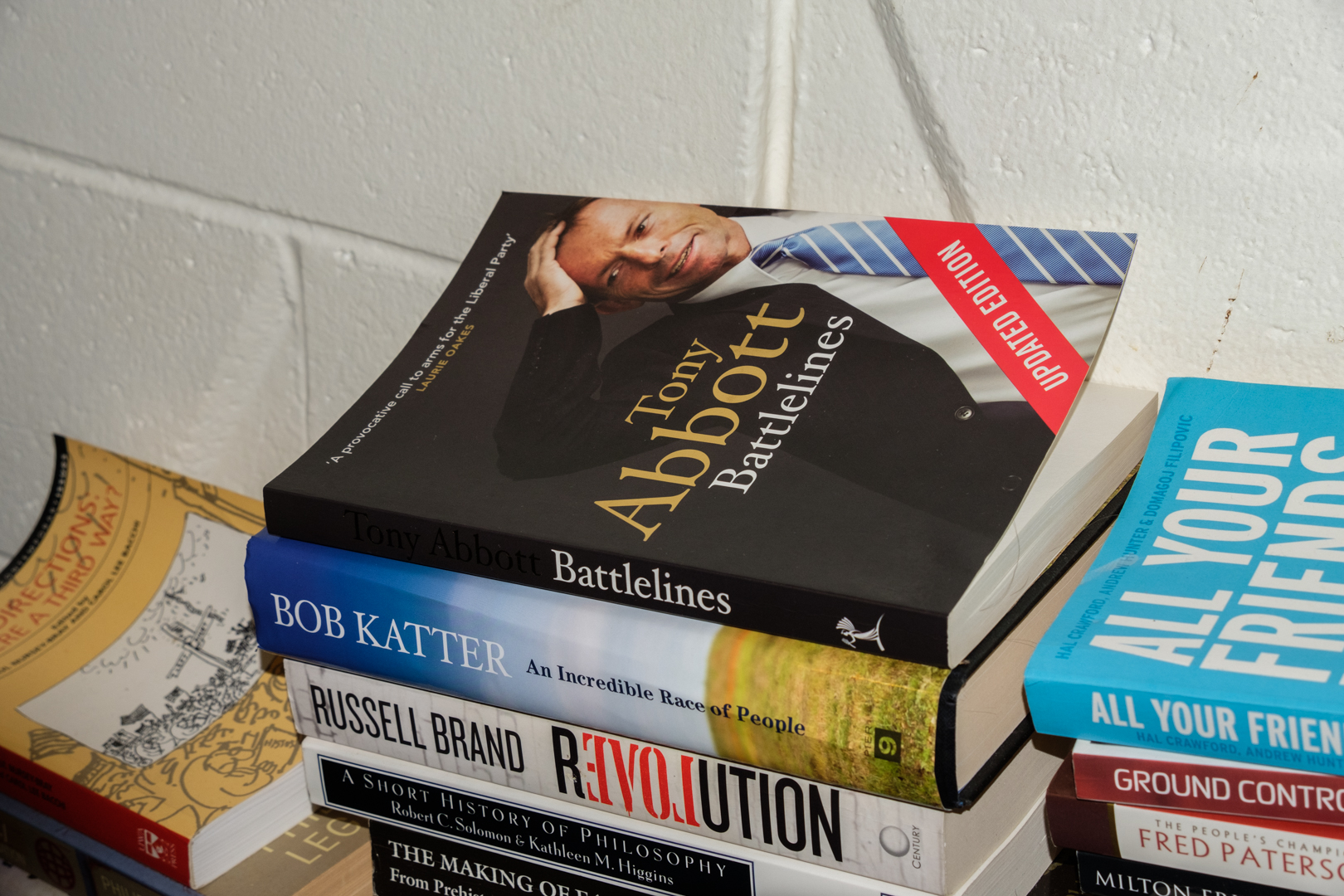
Book Nook – Battlelines by Tony Abbott
Tony Abbott is not a smart man. Beneath the thin veneer of political savvy lies a man whose politics are solely derivative of an enormous ego. Tony personally identifies with conservative institutions like the monarchy, family and church, and so his inability to perform any kind of self-reflection extends to these as well. This is a man born in privilege whose greatest challenge in life was when the media once scrutinised him and who claims that being a politician is as hard as a soldier. A man who has been handed every job he’s ever had by an old boys network, yet asserts that folks on disability pensions need more incentive to work. The 28th Prime Minister of Australia.
(more…) -
Book Nook – Descent by Ken MacLeod
Ken MacLeod’s strength as a sci-fi writer is his inventive world building. He pulls together elements from history and social theory to create future societies which are unexpected yet plausible. Descent serves primarily as a tableau which Ken paints with echoes of the New Deal, as the reader follows Ryan’s coming of age journey and those of his close friends who share a tight bond. The bond of an alien abduction. This is still sci-fi, after all.
While the story is nominally powered by the mystery of the aforementioned abduction, I found myself drawn more to the way the world developed around it. MacLeod paints a world where following a series of crises, capitalism had to be saved from its own contradictions through a social democratic Big Deal that may have only papered over these contradictions but certainly improved the conditions of life for Ryan and his friends.
The Big Deal provides the conditions necessary for ramjets, drones and all sorts of technological maguffins which our sci-fi novel needs. But the real story is not rockets and space travel, but Ryan’s personal journey, as he falls into and out of love, distorted by jealousy into a twisted individual who spends his days stalking his ex-fiancee through the obiquious surveilance drones present in this world.
Ken draws some excellent parallels around our own presentation and self-censorship in a future society where surveillance is commonplace. Between the conspiracy theories which Ryan is drawn to after his abduction, the revolutionaries who hide in the business world, the public or private spooks and the scientists protecting their research from public eyes, this becomes the central pivot about which the story swings.
This book retains faith in the intelligence and engagement of its readers, with a resolution which doesn’t spell out answers to all the questions posed earlier. I’m a sucker for this kind of storytelling which leaves the reader to infer their own answers, but when combined with a rapidly paced conclusion this could leave some readers unfulfilled.
The characterisation is better than you might expect from a genre renowned for cardboard cutouts, and MacLeod peppers the dialogue with Scottishisms to breathe an earthy charm into them. The prose reads well, establishing fearful scenes on the foggy moors while keeping the story moving along at a steady clip.
On the whole, Descent is an enjoyable romp through the lives of well-developed characters which touches on science and society and raises questions without getting bogged down in treatises.
Descent was published by Orbit Books in 2013. My copy was purchased 2nd hand from a Lifeline Bookfair.
-
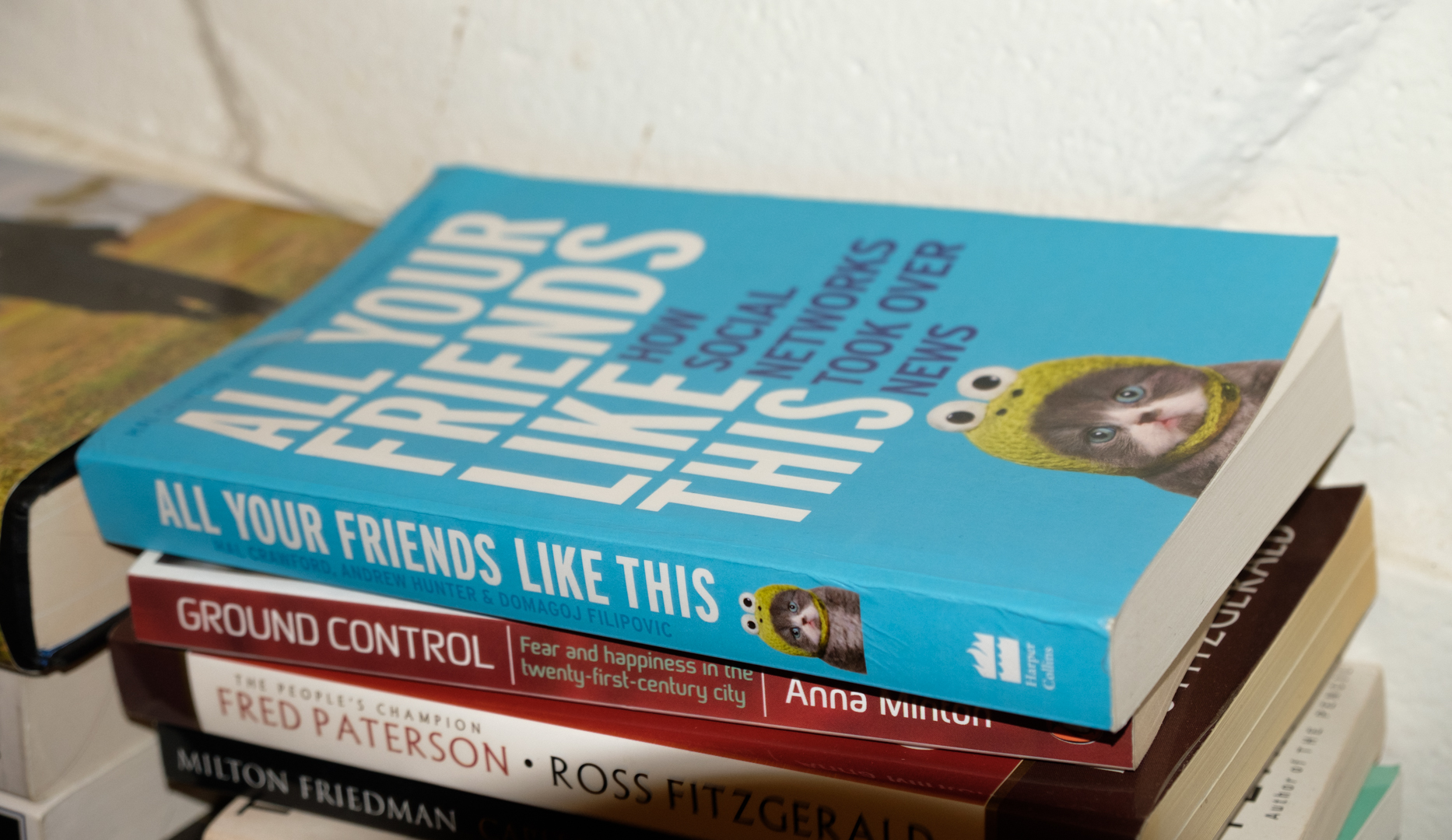
Book Nook – All Your Friends Like This: How Social Networks Took Over News by Hal Crawford, Andrew Hunter & Domagoj Filipovic
All Your Friends Like This: How Social Networks Took Over News provides a great demonstration of how the short staffing and search for impressions over substance has crippled modern journalism. Unfortunately, this book is an example rather than an explanation.
-
Book Nook – An Incredible Race of People: A Passionate History of Australia by Bob Katter
Bob Katter Jr is a riddle wrapped in an enigma topped with a cowboy hat. A man renowned for the social conservatism which led him to claim there were no gay people in his electorate, and yet who also criticises the Rudd/Gillard industrial relations reforms as not going nearly far enough in favour of workers. A man who lists as paragons ‘Red Ted’ Theodore and Ben Chifley but who served in the cabinet of Joh Bjelke-Petersen. The best way to understand a man is to listen to what he has to say, so I’m reading An Incredible Race of People to see if this enigma can be unravelled.
This is Bob’s history of Bob’s Australia, and he deploys a narrow but deep gaze upon the elements and characters which have crafted his vision of Australia. The informality of his writing style fits the oafish hick persona which Bob is happy to play up to the media, but the depth and range of references demonstrate a far wider range of scholarship than would be expected, and certainly more than that presented by Tony Abbott, by way of comparison. Nonetheless, this is a tale full of tough blokey men from the Queensland outback who weren’t afraid to ruffle the feathers of those ivory tower dwelling city-slickers.
Katter eschews the classical first fleet narrative and heads straight to Cloncurry’s founding and Queensland’s development in the late 1800s. Curiously for a man who served 26 years in parliaments for the National Party before splitting away, the story of early life in Australia is seen almost entirely through the lense of unions and the Labor Party fight for worker conditions. Bob lays down the depth of deprivation for regular workers in early 1900s Queensland, as large corporations like CSR applied their monopsony power to place workers in what he deems “almost like a master-servant relationship”. Against this corporate tyranny, ‘Red Ted’ Theodore and the AWU rose up to struggle for workers rights. We can begin to see the genesis of Bob’s political vision as he cheers on the actions of the Labor government to establish binding wage arbitration, redistribute land from big corporations to ordinary workers, establish a series of government owned abbotoirs and abolish the upper house of parliament.
Bob wants government to be an active participant in society, rather than a bystander and facilitator. Whether this is through direct public intervention like the Theodore government or through subsidy of private corporations as in the Bjelke-Petersen government is not important. He has no faith in the market sorting itself out. But along with this, he also has no care or conception for conflicts of interest or abuse of power. Aggressive and flagrant ethical violations are continually justified as the required actions of these great men of history. As Bob puts it, “the propriety of their methods was of little concern to a Bjelke-Petersen or a Theodore, men who had a nation to build.”
This talk of aggressive government intervention might bring to mind Fred Paterson and the communist presence in North Queensland at this time, but Bob is keen to draw a line between his heroes and the hard-left. Katter decries the “anti-win mentality of the left” who were “more interested in class warfare than development and prosperity.” In practice, this appears to be primarily a matter of mentality rather than policy for Bob, who happily cheers on Theodore’s vision of “an owner-operator society where men sold their labour through collectively owned means of production” and union direct action against scabbing as “a rallying point of victory and success by the Australian people”.
The Australian people’s fight in New Guinea is the subject of a fairly routine retelling, which tells us more around its edges and absences than in the bog-standard story. He dedicates a fifth of the book to this fight in World War Two, but mentions WW1 only in passing through the fight against conscription, and completely ignores any wars since. Again, this is Bob’s history of Bob’s Australia, an idiosyncratic tale. His nationalism comes through in his condemnation of the leaders who were subservient to Britain and whose actions which were more concerned with the protection of the motherland than Australia. But in the consideration given to Japanese anti-colonialist objectives he demonstrates a wider perspective than would be expected, especially from a book titled An Incredible Race Of People.
The core of Bob’s philosophy is best distilled through his lionisation of the Bjelke-Petersen government and what he calls Developmentalism. The environment exists to be exploited by man, and government’s job is to facilitate that. His heroes here shift to men like Les Theiss, Laurence Harnett and Essington Lewis (who was also raised as an exemplar by Andrew Leigh, subject of my last Book Nook), those who rose from working class origins to build companies associated with production and retained that connection with their workers. Government should be actively involved in building these companies, with tariffs, contracts and subsidy all considered.
These blokes are seen as underdogs fighting against the evils of foreign corporations, and are encouraged by government in order to ensure these industries are Australian owned. But with such a focus on development over other considerations, Katter is quite willing to let graft and insider trading slide as long as it is in the service of this ideology. The same Russell Hinze who resigned from parliament after damning reports of corruption to Bob “represented what Australian politicians should be.”
In Katter’s telling, Australia’s decline started with the ascent of Gough Whitlam. But this was not for the issues you might expect a conservative to take with the great reformer – Bob sees Whitlam as starting the rise of the ‘educrat’, politicians who were university educated bureaucrats rather than the traditional working class with “dirt under their fingernails”. The great issue which Katter takes with the Whitlam government is the unilateral slashing of tariffs. The protectionism implicit in these tariffs is core to the developmentalist philosophy which Katter espouses. So rather than my view of Whitlam as the last great social democrat, Katter considers Gough as the first neoliberal (which he terms Marketism, but is better known by the common term).
Since Whitlam, Bob traces the gradual growth of neoliberalism and free trade, demonstrating how these policies have hurt primary producers and the rural areas. He sees Keating and Costello as ideologues responsible for aggressive free trade policies and the National Party abandoning the party’s values in favour of this market-centred ideology. The willingness of these politicians to drop our trade barriers without corresponding reductions in subsidy from our partners comes in for particular opprobrium. Bob’s country focus delivers a perspective on these policies which city-slickers in the service industries like myself often fail to consider. In outback North Queensland where 25% of the population are employed in mining and agriculture is clearly the 2nd biggest employer, the impacts on these industries are critical to the survival and success of regional communities.
However, this focus also flows through into a complete ignorance of environmental issues. Although Bob is happy to stop importation of foreign foods to prevent the spread of disease, he sees these concerns only through the realm of production and development. He deems the World Heritage declaration of the Daintree Rainforest “an economic iron curtain”, blaming it for the suicide of former timber mill workers. When he puts forth his vision for the future, he suggests that rather than reducing irrigator water allocations to ensure flow through the Murray-Darling Basin, he would rather reduce the size of the Alexandrina and Menindee Lakes.
This future vision lays the environmental devastation which Katter supports clear. He sees massive geoengineering schemes, from a seawater canal between the Spencer Gulf and Lake Eyre to massive damming in Queensland and WA to create the conditions for massive sugar cane fields. Bob sees an Australia with a rapidly increasing immigration program, in order to build a country of 55 million people by 2037. He wants to be one of the great men he depicts, building Australia through massive infrastructure schemes.
But Bob’s history is also notable in what he chooses not to include. There are hardly any woman in his story, nor any mention of the vast change in womens’ status in Australian society. Social issues in general are scarce, as he focuses entirely on these great men of business and politics. This fits entirely with his political focus, but allows some of his more loathsome personal opinions to avoid scrutiny.
Fundamentally, Bob Katter’s vision of the world is rooted in the past. He is best seen as a pure conservative, looking to take us back to the days of his childhood in the 1950s, a world of big men with big egos building the nation on the sheep’s back. But unlike those who wear the trappings of social conservatism in order to camouflage an aggressive dedication to markets, the past Bob wants to return to includes strong unions, worker protections, government investment and acceptance of immigrants. With his prediliction for development regardless of the consequences, he certainly shouldn’t be allowed anywhere near the levers of power. But nonetheless, city folks should pay heed to the opinions of those like Bob who understand the impact of policy on regional areas. The National Party could stand to be closer to Katter’s prescriptions rather than those of Barnaby Joyce.
An Incredible Race of People: A Passionate History of Australia by Bob Katter was published by Murdoch Books in 2012. My copy was purchased 2nd hand at a Lifeline Bookfair.
-
Book Nook: Battlers & Billionaires by Andrew Leigh
Once a professor of economics, Andrew Leigh is now the MP for Fenner and one of the leading intellectual lights of the Labor Party. Having reached the shadow cabinet without the backroom benefits of factional alignment, he brings a vision beyond simple pugilistic politics to parliament. Andrew is also a prolific author, so I picked up his Battlers & Billionaires to see what insights could be gleamed from the unaligned man.
It is clear that Leigh genuinely cares about rising inequality in Australian society. He focuses this book tightly on it, providing a brief history of its colonial expansion, post-war contraction and recent explosion peppered with graphs and anecdotes. The conversational style he employs gives Battlers & Billionaires an easy-reading style which is sorely lacking in many books on the dismal science. The style may be new, but the story is instantly familiar to anyone who has read Piketty’s wildly popular Capital in the 21st Century, albeit localised to Australian conditions.
Leigh points at the globalised labour market, declining union membership and lowering of top tax rates as drivers, all of which are reasonably argued. However, in his assertion of insufficient education as a key driver of inequality, Andrew demonstrates an uncritical approach to economic theory which pervades this work. Consider how Leigh puts forth Goldin & Katz’s theory of the race between education and technology:
One of the most intriguing explanations of what drives inequality was put forth recently by the Harvard academic super-couple Claudia Goldin and Larry Katz. They suggest that we should think of inequality as a ‘race’ between technology and education. In eras when technological advances outpace schooling attainment, the gap between rich and poor widens. But in times when the quantity and quality of education increases, so too does inequality.
…
In the past generation, US educational attainment has stagnated while technology has continued to advance. Technology is winning the race, and US inequality is skyrocketing.
How does Thomas Piketty consider the same theory?
The most widely accepted theory is that of a race between education and technology. To be blunt, this theory does not explain everything. In particular, it does not offer a satisfactory explanation of the rise of the supermanager or of wage inequality in the United States after 1980. The theory does, however, suggest interesting and important clues for explaining certain historical evolutions.
…
In order to understand the dynamics of wage inequality, we must introduce other factors, such as the institutions and rules that govern the operation of the labor market in each society. To an even greater extent than other markets, the labor market is not a mathematical abstraction whose workings are entirely determined by natural and immutable mechanisms and implacable technological forces; it is a social construct based on specific rules and compromises.
This is the difference between one author who questions everything in order to rebuild from the empirical data and another who cannot see past the ideology embedded in orthodox economics. Perhaps comparing Leigh’s book with one which was published a year afterwards is unfair, but Piketty has rightly established himself at the heart of any modern discussion of inequality.
Andrew’s uncritical approach colours the remainder of the book and the prescriptions he draws. Any actions which swim against the orthodoxy are dismissed out of hand, as Leigh suggests that “capping CEO salaries might sound tempting until you recall reports from the 1980s and 1990s that bemoaned the low quality of Australian managers” and “few people would argue for reinstating the 60 per cent top income tax rate that prevailed a generation ago, which surely deterred some entrepreneurs”.
Without confronting the ideological backing for economic shibboleths like these, Leigh has little ammunition left with which to deal with the problem. Any conservative would be proud of the way he derails the book for a chapter bemoaning the decline of traditional families, trying to argue that unstable families are a cause of poverty rather than a consequence. He completely fails to grasp the purpose of private schools, suggesting that unintentionally “by privileging the children of ‘old boys’ and ‘old girls’, such schools are reducing the amount of social mobility in Australia”. That is of course the entire point of private schools – to segregate the rich from the poor and entrench existing class hierarchies.
So after demonstrating both the importance of and public support for reducing inequality, we finally reach his solutions. Andrew asserts that in order to reduce inequality, we need to:
- Maintain the policy of open markets and encouraging innovation which have delivered economic growth over the past decades.
- Improve our education system, particularly for those from poor backgrounds. There should be incentives for the best teachers to work in the most disadvantaged schools.
- Encourage relationship stability with light-touch programs that encourage more ‘concerted cultivation’ in the most disadvantaged households.
- Recognising the role of trade unions, perhaps with laws that give them the chance to pursuade new employees to sign up.
- Make sure that welfare spending continues to be targeted at those most in need. Ensure that everything is means-tested.
- Maintain a progressive income tax system.
- Evaluate social policies more accurately with randomised trials.
- Keep egalitarianism at the heart of our national story.
Despite his thorough history of inequality and genuine passion for reducing it, Andrew has become so boxed-in by orthodoxy that he can’t offer any meaningful solutions. The underlying assertion is that as long as we don’t actively make things worse, inequality will fix itself. Never mind that expanding means-testing will only serve to stigmatise recipients, if structural change or even raising taxes on the rich have been ruled out by ideology then these limited measures become the only option. Leigh exemplifies the problems inherent in the modern Labor Party’s vision, which is so wedded to neoliberal economics that no matter what concerns they may have with the outcomes, the policy prescription cannot be changed.
I can’t entirely condemn Andrew Leigh. On a fundamental ethical level he gives a damn about inequality and its growth in this country. This book may even convince those on the centre-right to care about it. Given the paucity of public intellectuals willing to commit to policy discussions rather than backroom gossip, his intent to spark a discussion with this book is laudable. But without a willingness to confront one’s own ideology, intent can only go so far.
Battlers & Billionaires by Andrew Leigh was published by Redback in 2013. My copy was loaned from Queanbeyan-Palerang Libraries.